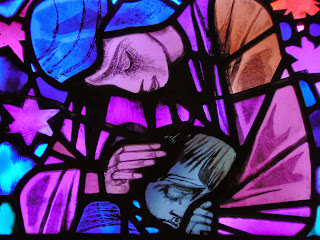 |
| Image Credit: www.newyorker.com |
But how should thoughtful followers of Jesus mark this day? We might be tempted to follow along with those who want to politicize and moralize but I'm not quite sure that either of these approaches would fall in line with how Jesus would lead his followers--those charged with bearing witness to his life, work, and Kingdom--to engage.
I was a fetus of 4 months when the Roe v. Wade decision was announced. For most of my lifetime the approach of the Christian community has been to attempt to fix the problem at the point where they think it went wrong--at the government/judicial level. This approach seeks to elect politicians who will protect the unborn or lobby for the potential Supreme Court justice (or the right President who will nominate said justice) who will finally overturn the fateful decision.
While it would be wonderful if we did indeed protect the unborn institutionally, this approach is flawed at many levels. First, abortion existed in our country long before Roe v. Wade. The problem is not political. Second, politics (especially in a democratic society) are always downstream of power, money, and culture. Third, abortion exists in our society because we have developed a tolerance for it. We tolerate it because we value privacy, convenience, and individual liberties over other things which we will enumerate in a moment. Fourth, our values are determined by our worldview. Passing a law never changed any person's worldview. You might prevent an abortion if it is illegal, but whether we're talking about prohibition or a war on drugs or anti-sodomy laws I think we all know how good a job political solutions do at managing human behavior.
Politics is the easy road to reform that changes nothing. What is much more difficult, but ultimately the only thing that is ever effective, is to challenge the practice at the level of value, which stems from worldview. We must come to value things we don't currently uphold, and since values arise from worldview it means that it must be approached at the worldview level. Most people, including a great many professed Christians, do not possess a biblical worldview. Understanding our own beliefs informs us on how we can engage this in a manner consistent with the heart of our Savior and builds bridges by which actual change might come about at the most basic level. When does abortion end? It ends when a vulnerable, expectant woman chooses not to have one. Why would this harder option chosen over the accessible option of termination? Here are some reasons:
Since all humanity is made in the image of God, the unborn child bears this image and as such holds immeasurable, inherent value.
 Now, not everyone believes that each and every human being is made in God's image, including many professed Christians who historically have been quick to dismiss this quality for Africans, migrant farm workers, death row inmates, fatherless youths, people of other faiths, or anyone else who made their lives inconvenient or unpleasant. The Bible, however, leaves no room for categorization. If the prevailing worldviews represented in our various Western subcultures hold sway then it is easy to terminate a pregnancy as the being in the womb is reduced to mere tissue of which one is easily disposed. A being that inherits God's image and the infinite value that comes with it is not so easily discarded.
Now, not everyone believes that each and every human being is made in God's image, including many professed Christians who historically have been quick to dismiss this quality for Africans, migrant farm workers, death row inmates, fatherless youths, people of other faiths, or anyone else who made their lives inconvenient or unpleasant. The Bible, however, leaves no room for categorization. If the prevailing worldviews represented in our various Western subcultures hold sway then it is easy to terminate a pregnancy as the being in the womb is reduced to mere tissue of which one is easily disposed. A being that inherits God's image and the infinite value that comes with it is not so easily discarded. Protecting the weak is a primary occupation for the Christian.
No one is more vulnerable than an unborn child. The unborn is utterly dependent for every thing necessary for life from the host, the mother that carries him or her in her womb. If our duty is to protect the vulnerable then it becomes incumbent upon us to choose loving, protecting, and serving the powerless one as opposed to serving our own interests--even those interests that might otherwise lead to a decision to terminate.
Those who follow the example of Jesus extend sacrificial, accepting, forgiving love to all involved.
 |
| www.choiceline.org |
Christ-followers ache over the realities of this broken world.
The reality of abortion in our nation is a tragedy. We could approach this tragedy from the high ground of moral self-righteousness and yell at the brokenness as though we have no sin. Or, we could use this as a day of acknowledging, confessing, and repenting of our own sin and mourning the state of brokenness that sin in general has wrought on the human race. Abortion is a symptom among many of a deeper issue, an issue that took Christ to the cross but one that finds resolution in the resurrection and all that follows. We ache for the redemption and restoration of all things. Our aching hope prepares us to respond in grace, love, and humility. When a suffering mother encounters grace, love, and humility, it might just give her the courage to walk the harder road and give birth to an image bearer with incredible capacity to show God's glory.





